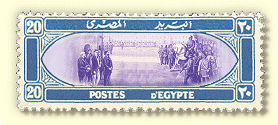

In September 1881, an Egyptian-born officer, Colonel Ahmed Arabi Pasha, rose up against the Khedive and demanded the dismissal of all his ministers. Britain and France were unsure of what they should do to protect their investments in the Suez Canal. They were agreed that the Ottoman Turks should not go to the rescue of what should have been an Ottoman colony. The Suez Canal had become too strategically important to the Imperial powers to allow its ownership to fall into dispute or into hostile hands. The Gladstone Government in 1882 invaded Egypt, ostensibly to oust a despotic military government. With the occupation of 1882, Egypt became a part of the British Empire but never officially a colony. The khedivial government provided the fašade of autonomy, but behind it lay the real power in the country, specifically the British Agent and Consul General, backed by British troops. This "temporary" arrangement was to last some seventy years.  This period is represented by the British military marks and postal history from British forces using the Egyptian postal system. Normally it is also considered to include the Sudanese War (1881-1885) against the Mahdi and the second Sudanese War (1896-1899) up to the defeat the forces of the Mahdi's successor, known as the Khalifa.
|
|
|